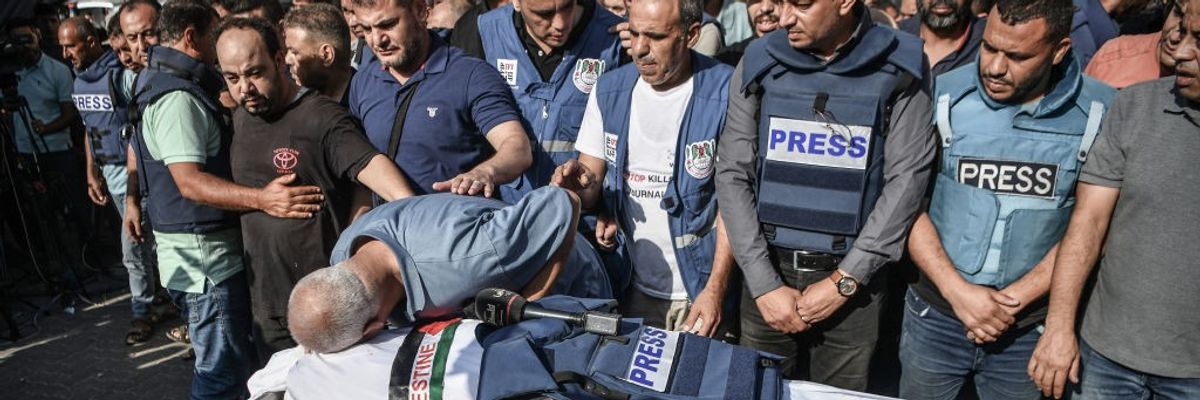The largest U.S. Muslim advocacy group on Friday implored American and international media outlets to speak out against Israel's killing of more than 100 journalists, almost all of them Palestinians, during the ongoing assault on Gaza.
The Council on American-Islamic Relations (CAIR) renewed its plea following Israeli airstrikes on the homes of
Palestine TV journalist Tamim Ma'mmar and Al-Aqsa TV's Abdullah Al-Sousi. Ma'mmar was killed along with his wife and two of their children, while the other attack killed Al-Sousi and two of his nephews, according toQuds News Network.
"The only thing that can explain the shocking silence of American and international media professionals about the mass killing of their Palestinian colleagues is the decadeslong and systematic dehumanization of the Palestinian people, in which the lives of Palestinians have lesser or no value," CAIR national communications director Ibrahim Cooper said in a statement.
"Journalists worldwide must begin to speak out about these killings and about the Israeli genocide in Gaza," he added.
Israel is
on trial for genocide at the International Court of Justice in The Hague. Its 308-day assault on Gaza has left more than 142,000 Palestinians dead, wounded, or missing, according to local and international officials.
Preliminary investigations by the New York-based Committee to Protect Journalists
found that at least 113 media professionals—including 108 Palestinians, three Lebanese, and two Israelis—have been killed during the war, "making it the deadliest period for journalists since CPJ began gathering data in 1992."
CPJ has
condemned what it called an "apparent pattern of targeting journalists and their families," noting cases in which media workers were killed while wearing press insignia and after being threatened by Israeli officials.
Gaza's Government Media Office
said this week that Israeli forces have killed 166 journalists since October.
In May, the Paris-based press freedom group Reporters Without Borders (RSF)
filed a third complaint at the International Criminal Court alleging "war crimes against journalists in Gaza."
RSF said it had "reasonable grounds for thinking that some of these journalists were deliberately killed and that the others were the victims of deliberate IDF attacks against civilians" and accused Israel of "an eradication of the Palestinian media."
The following month,
the Gaza Project—led by the Paris-based nonprofit Forbidden Stories—published a report detailing a "chilling pattern" of Israeli forces apparently targeting journalists during the war.
Human Rights Watch and Amnesty International have called for official investigations into Israeli killing of journalists including an October 13 attack that
killed 37-year-old Lebanese Reuters videographer Issam Abdallah and wounded half a dozen other journalists who were covering cross-border clashes between Israeli troops and Hezbollah fighters in southern Lebanon.
Dylan Collins, an American deputy editor at
Al Jazeera English, was wounded while administering first aid to Christina Assi, an Agence-France Presse journalist who was seriously wounded in the attack. Assi-one of whose legs was amputated—recently carried the Olympic torch in Paris.
CPJ president Jodie Ginsburg recently
toldAl Jazeera that the killing of journalists by Israeli forces "appears to be part of a broader strategy that aims to stifle the information coming out of Gaza."
